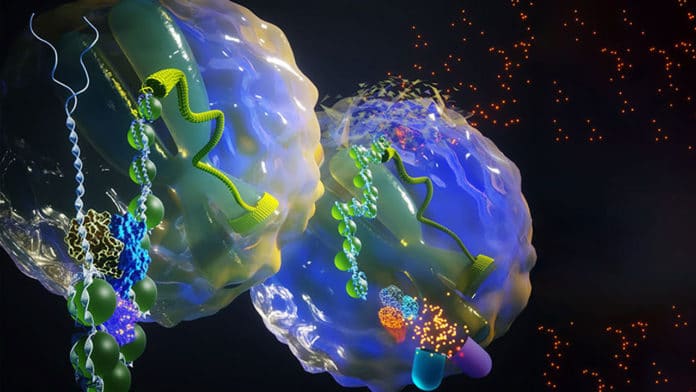DNA is tightly wrapped around histone proteins in human cells, collectively referred to as chromatin. These form a physical barrier to all DNA-based processes. Specialized protein machinery has evolved that consumes energy and modulates the physical state of the DNA for its functional activation. These complexes work closely with DNA-binding regulatory factors called transcription factors to impart distinct cellular identity and function.
The switch/sucrose non-fermentable (SWI/SNF) complex is crucial in chromatin remodeling. It controls the arrangement of DNA and compacts to fit within a cell’s nucleus. An essential subunit of this complex provides energy to unwrap DNA to access enhancer elements that crank up the expression of cancer-driving genes.
In the current study, researchers at the University of Michigan Health Rogel Cancer Center demonstrated that the SWI/SNF complex facilitates access to enhancers that oncogenes can bind to and drive downstream gene expression in cancer. Degrading a subunit of this complex blocks the oncogenes.
The finding reveals a novel approach to treating prostate cancers fueled by different genetic drivers, representing upwards of 90% of all prostate cancers.
“This is the first demonstration in cancer that blocking access to chromatin can be pursued as an avenue to treat cancer. By compacting the chromatin around these enhancer elements, transcription factors are blocked from binding to the enhancer elements that drive cancer,” said study author Arul M. Chinnaiyan, MD, Ph.D., director of the Michigan Center for Translational Pathology and S.P. Hicks Professor of Pathology and Urology at Michigan Medicine.
The researchers looked at several prostate cancer models that expressed different oncogenes. They found that blocking the SWI/SNF complex slowed cancer cell growth and induced cell death, especially in tumors driven by FOXA1 or androgen receptors. There was no effect on benign prostate cells.
In normal development, the SWI/SNF complex is essential. “Normal cells can survive with default levels of gene transcription, but cancer cells are particularly addicted to these enhancer regions. They need access to these enhancers to jack up the expression of oncogenic targets,” Chinnaiyan said.
Components of the SWI/SNF complex are mutated in several cancers but rarely in prostate cancer. Prostate cancers driven by androgen receptor or FOXA1 were more sensitive to an SWI/SNF degrader than even cancers in which subunits were mutated.
“Without having mutations, and with just oncogenic transcription factors involved, prostate cancer cells were exquisitely sensitive to this degrader, even more so than lung cancer where a component of the pathway was mutated,” Chinnaiyan said. “By disabling this SWI/SNF complex, we saw preferential activity against certain cancers and no toxicity in normal cells or normal tissues. This bodes well for clinical studies using compounds that target this pathway.”
It also suggests using this approach for other types of cancer addicted to oncogenic transcription factors, including some multiple myelomas and other blood cancers.
“To our knowledge, this is the first study to demonstrate that physical chromatin accessibility can be modulated at non-coding regulatory elements as a novel therapeutic strategy in cancer treatment. Thus, recently developed SWI/SNF ATPase inhibitors and degraders add to the growing arsenal of chromatin-targeted therapeutics for directly combating enhancer addiction in human cancers, warranting assessments of their safety and efficacy in clinical trials.” Study quotes.
The researchers used an SWI/SNF degrader in the Indian company Aurigene Discovery Technologies. These compounds are being developed for future clinical trials.
The Rogel team will continue to study the biology of this complex, help develop compounds that target this complex, and evaluate what other cancer types might respond to this approach. They are exploring a combination therapy using the SWI/SNF degrader for prostate cancer with an anti-androgen therapy in the laboratory. This approach is not yet in clinical trials.
Journal Reference
- Xiao, L., Parolia, A., Qiao, Y. et al. Targeting SWI/SNF ATPases in enhancer-addicted prostate cancer. Nature (2021). DOI: 10.1038/s41586-021-04246-z
